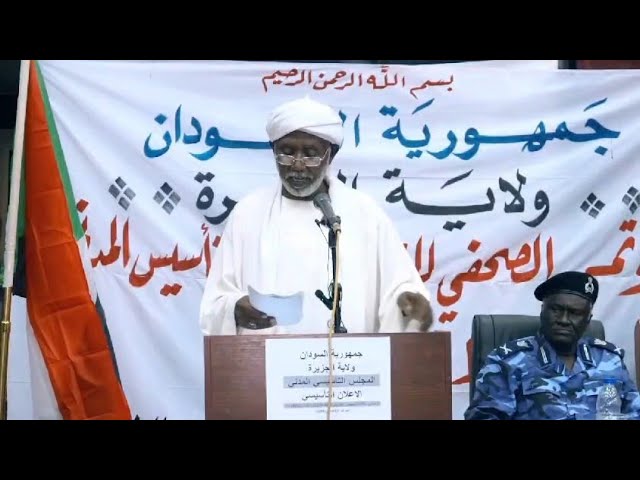Sudan: RSF establish civilian authority in El Gezira

Siddig Osman, elected chair of the new civilian authority of El Gezira, in a press conference in Wad Madani, March 24 (Photo: @RSFSudan via X)
The Rapid Support Forces (RSF), in control of most parts of El Gezira, has formed a ‘civilian administration’ system in the state. Siddig Osman was elected head of the new authority in a ceremony in the state capital Wad Madani on Saturday.
The RSF which control El Gezira except the area of El Managil since December 18, formed a Civilian Foundress Council, an informed source reported to Radio Dabanga yesterday.
The council elected Professor Siddig Osman as head of the new civil administration authority in Wad Madani on Saturday, in the presence of prominent native administration*, other community leaders, and representatives of civil society organisations in the state.
In a press conference following his election, the new civil administration head pledged “to lay solid foundations for federal rule despite the challenges”.
He called on the displaced in the state to return to their homes and protest the airstrikes of the Sudanese Air Force bombing targeting their homes.
The new native administration is to restore administrative order, protect civilians, and provide basic services in coordination with the RSF.
The Civil Founding Council consists of 31 members representing the localities of El Gezira, who were chosen through consensus from the local communities. The council is headed by Professor Ahmed El Bashir.
El Bashir described the establishment of the new administration in El Gezira as “a unique experience” and appealed to international organisations “to cooperate to achieve the declared goals of the native administration” and called on the people of El Gezira “to work together to build the state”.
The council head further called on the leaders of the RSF and the Sudanese Armed Forces (SAF) “to take a courageous decision to stop the war”.
RSF Commander Mohamed ‘Hemedti’ Dagalo in September last year strongly opposed the “creation of an alternative capital” by the de facto Sudanese government in Port Sudan, capital of Red Sea state, and threatened to set up “a genuine civilian authority” in the areas under its control, with Khartoum as capital.
RSF troops have been wreaking heavy havoc in dozens of villages in El Gezira since they seized control of the state.
Currently, the SAF, together with combatants of rebel groups, is preparing a large offensive to recapture the strategic area.
Independent administration
These days, many parties loyal to the army are calling for the formation of a civilian government in Port Sudan, the international Asharq Al-Awsat news outlet said yesterday.
The Arabic newspaper also noted that the formation of a native administration separately from the central authorities “is not a new experience in Sudan”. The Sudan People’s Liberation Movement-North under the leadership of Abdelaziz El Hilu (SPLM-N El Hilu) has also set up an independent administration in the areas in the Nuba Mountains, South Kordofan, it “liberated from the yoke of the authority in Khartoum” and called it the Civil Authority of the New Sudan.
The mainstream Sudan Liberation Movement headed by Abdelwahid Mohamed Nur (SLM-AW), operating from the Jebel Marra massive in central Darfur, also established a “civil authority in the liberated territories”.
These two movements are known as the ‘hold-out rebel groups’, as they did not join the negotiations that led to the Juba Peace Agreement, signed by the Sudanese government of PM Hamdok and the Sudan Revolutionary Front coalition of rebel movements in October 2020. SPLM-N El Hilu entered separate talks at the time, but withdrew following RSF attacks on villages in the Nuba Mountains. Negotiations resumed in 2021 but did not lead to an accord. Mohamed Nur insists on the military ending the violence in Darfur before joining peace talks. He prefers an inter-Sudanese dialogue to discuss the root causes of Sudan’s recurring crises first.
* The Native Administration was instituted by British colonial authorities seeking a pragmatic system of governance that allowed for effective control with limited oversight by the state. The state-appointed tribal leaders were also responsible for executing policies, collecting taxes, and mobilising labour on behalf of the central government. The Native Administration during the 30-year rule of dictator Omar Al Bashir reportedly did not represent the real community leaders. After the outbreak of the war with the Sudanese army in April 2023, the RSF occupied Khartoum, four of the five Darfur states, and El Gezira, where they, except for the Sudanese capital, appointed native administration leaders who are to deal with the management of these states.











 and then
and then